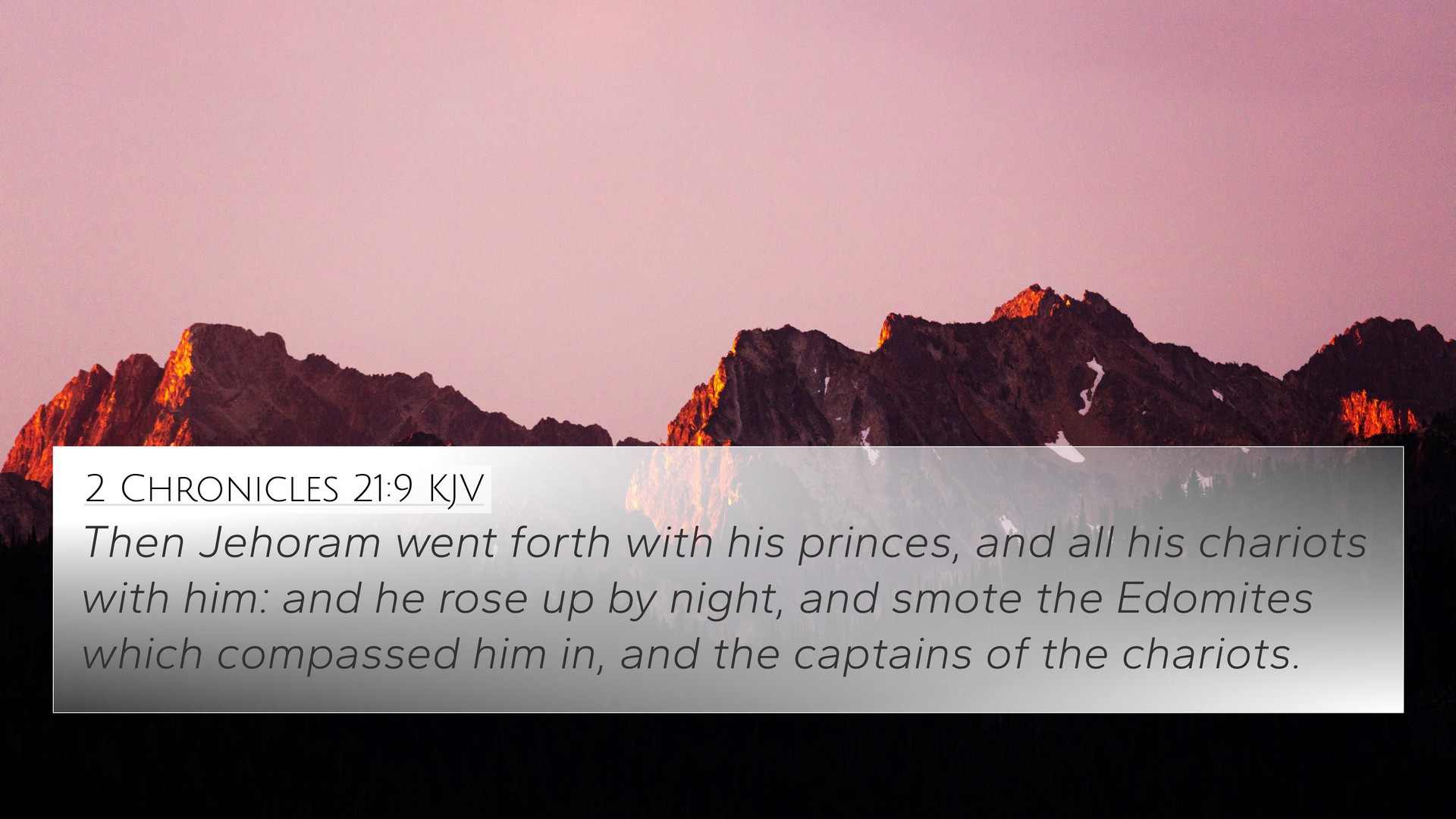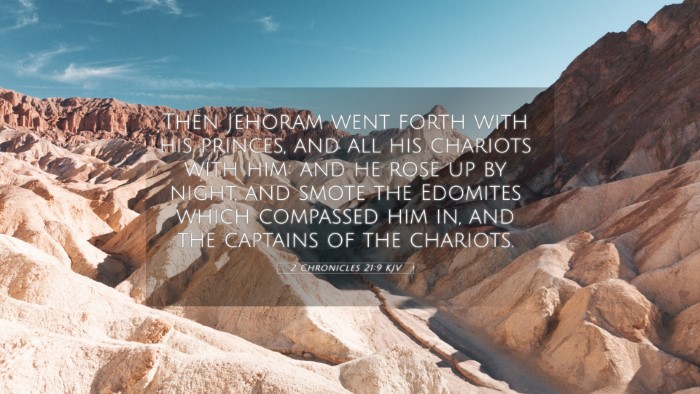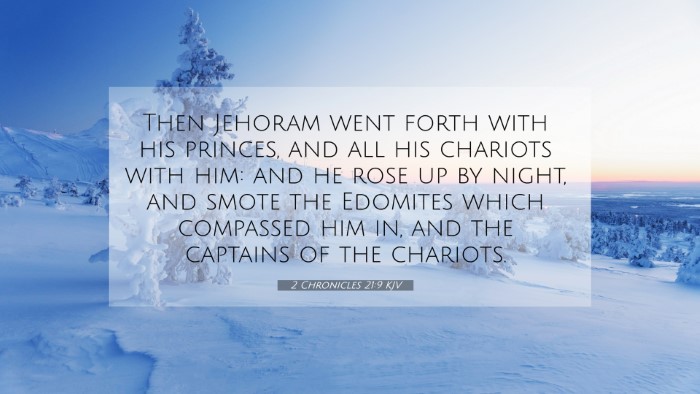Summary of Meaning
This verse describes a significant event during the reign of King Jehoram of Judah, highlighting his military action against the Edomites. It showcases Jehoram's strategic maneuvering during a time of conflict and reflects both his leadership qualities and the tensions his kingdom faced.
Commentary Insights
Insights from public domain commentaries, such as those by Matthew Henry, Albert Barnes, and Adam Clarke, provide a deeper examination of this verse. Here’s a synthesized interpretation:
- Military Strategy: Matthew Henry comments on Jehoram's decision to take action at night as a tactical advantage. This demonstrates his resolve and willingness to confront external threats head-on.
- Historical Context: Albert Barnes reflects on the political landscape of Judah during Jehoram’s reign, noting that the Edomites were historically a troublesome neighbor, and this conflict illustrates the ongoing challenges faced by the kingdom.
- Leadership Qualities: Adam Clarke emphasizes Jehoram’s capacity to inspire his leaders and soldiers. His readiness to engage in battle emphasizes a characteristic of kingship prevailing in those tumultuous times.
- Spiritual Implications: Not all commentaries agree on the morality of Jehoram’s actions, as some suggest that such conflicts often relate back to the broader spiritual disobedience of Israel, which became a recurring theme in Chronicles.
- Divine Providence: The mention of military success can be interpreted through the lens of God's sovereignty, where victories or defeats are seen as reflections of the nation's allegiance to Him.
Bible Verse Cross-References
To broaden our understanding of this verse, we will explore several related Bible verses that provide further context and thematic connection:
- 2 Kings 3:22-24: This passage discusses another military conflict involving Moab, showing the complexity of Judah’s interactions with neighboring kingdoms.
- 2 Chronicles 20:15: God's assurance to Judah about their battles highlights the special relationship between God and His people, adding depth to Jehoram’s military endeavors.
- 2 Kings 2:1-11: The relationship between the prophets and the kings of Israel often provides insights into leadership behavior and divine expectation.
- 1 Chronicles 18:1: David's victories set a precedent for understanding military success in Israel's history, emphasizing divine approval in conflicts.
- Isaiah 34:5-6: This prophecy connects closely to themes of conflict, serving as a reminder of divine judgment against nations.
- Jeremiah 49:7-22: Prophecies regarding Edom offer insights into the Edomite kingdom's fate, reflecting historical animosities.
- Psalm 60:1-12: A psalm reflecting on military defeat and its spiritual implications helps provide context for the era's struggles.
- Joshua 15:1-12: The historical context of Judah's borders can illuminate early grievances that may have led to later conflicts.
- Proverbs 21:31: The verse elegantly captures the tension between human efforts and dependence on divine intervention in battle.
- 2 Kings 8:20: This recounting of the Edomite revolt against Judah connects the verse’s themes of rebellion and conflict, making them central to understanding Judah's narrative.
Thematic Connections
Understanding 2 Chronicles 21:9 also invites us to consider broader themes within the Bible, including:
- Leadership in Crisis: The response of leaders to challenges is a recurring theme, explored through various Biblical narratives.
- Divine Judgment and Mercy: The nature of God’s relationship with His people, particularly concerning their actions in times of trouble.
- The Role of Prophets: The function of prophetic voices during military actions connects Jehoram's actions to broader spiritual lessons.
- Historical Conflicts: The narrative reflects the tumultuous relationships between ancient nations and the role that faith played in warfare.
Cross-Referencing Biblical Texts
Utilizing tools for Bible cross-referencing aids in studying this verse. Here are methodologies and resources that can assist:
- Bible Concordance: A concordance can help identify keywords in 2 Chronicles and explore related verses more systematically.
- Bible Cross-Reference Guide: Look for guides that highlight connections between similar narratives and themes, deepening comprehension.
- Bible Reference Resources: Explore various reference materials aimed at aiding both personal and communal study.
- Cross-Reference Bible Study: Regular practice of cross-referencing can uncover layers of meaning that enrich one's understanding of scripture.
- Inter-Biblical Dialogue: Engage with biblical texts that speak to each other across Testaments to glean more profound insights.
Conclusion
In sum, 2 Chronicles 21:9 provides a snapshot of military action intertwined with such themes as divine sovereignty, leadership, and historical conflict. By leveraging cross-references and commentary insights, readers can enrich their understanding and observation of how scripture connects across various contexts.


